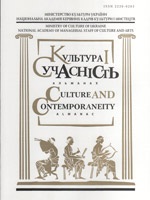The specificity of the philosophical and artistic comprehension of the world as a problem of the integrity of spiritual culture
DOI:
https://doi.org/10.32461/2226-0285.1.2019.179683Keywords:
spiritual culture, philosophy, art, creativity, freedom, manAbstract
The purpose of the article is to analyze the approaches of the ratio of philosophical and artistic understanding of the world, to consider the problem of the integrity of spiritual culture, as well as the search for models of the ratio of wisdom and creativity. The methodology is based on the application of General scientific and special methods of cog- nition, in particular: analysis, synthesis, logical method and generalization method. The scientific novelty lies in the introduction of the statement that philosophical creativity, following man into art, meets with a completely new image of man. To be human is to deviate from the goal, to distance oneself from abstraction, to overcome identification with the idea. Man can also be understood as creativity, which originates in the life of noumenal, that is, in freedom. Conclu- sions. Philosophy and art are those spiritual spaces in which not only individual beingness is embodied, but, in fact, in which the goal of further development of both man and humanity is formed. The creative potential of artists and philos- ophers creates a certain mood and is often the impetus for the concentration and ascent of the human soul through good to comprehend themselves.
References
Ортега-и-Гассет Х. История как система. Вопросы философии. 1996. ғ 6.
Воєводін О. Про своєрідність теоретико-естетичного знання. Дні науки. 1998 р. Київ: ―Київський університет‖, 1998. С. 65.
Горак Г. І. Філософія. Київ, 1998. С. 4.
Шестов Л. Сочинения. В 2 т. Т. 2. Москва: Наука, 1993. С. 27.
Борев Ю. Эстетика. Москва, 1988. С. 388.
Цветаева М.И. Об искусстве. Москва, 1991. С. 371.
Шеллинг Ф.В.И. Иммануил Кант. Сочинения. В 2 т. Т. 2. Москва, 1989. С. 30.
Кант И. Пролегомены. Москва, 1934. С. 118.
Шеллинг Ф.В.И. Система трансцендентального идеализма. Соч. в 2 т. Т. 1. Москва, 1987. С. 264.
Шестов Л. На весах Иова. Странствование по душам. Париж., 1975. С. 240.
Булгаков С. Свет невечерний. Москва, 1994. С. 332.
Ortega y Gasset H. (1996).History as a system. Voprosy filosofii, 6 [in Russian].
Voyevodin O. (1998). About originality of theoretical and aesthetic knowledge. Dni nauky. Kyiv.:
―Kyyivsʹkyy universytet‖ [in Ukrainian].
Gorak G.I. (1998). Philosophy. Kyiv [in Ukrainian].
Shestov L. (1993). Compositions. Vol. 2. Moscow: Nauka [in Russian].
Borev Yu. (1988). Aesthetics. Moscow [in Russian].
Tsvetaeva M. I. (1991). About art. Moscow [in Russian].
Schelling F.VI.I. (1989). Immanuel Kant. Vol. 2. Moscow [in Russian].
Kant I. (1934). Prolegomeny. Moscow [in Russian].
Schelling F.VI.I. (1987). The system of transcendental idealism. Vol. 1. Moscow [in Russian].
Shestov L. (1975).On the scales of Job. Wandering souls. Paris [in France].
Bulgakov S. (1994). Light of non-evening. Moscow [in Russian].
Downloads
Published
Issue
Section
License

This work is licensed under a Creative Commons Attribution 4.0 International License.
Authors who publish with this journal agree to the following terms:
- Authors retain copyright and grant the journal right of first publication with the work simultaneously licensed under a Creative Commons Attribution License that allows others to share the work with an acknowledgement of the work's authorship and initial publication in this journal.
- Authors are able to enter into separate, additional contractual arrangements for the non-exclusive distribution of the journal's published version of the work (e.g., post it to an institutional repository or publish it in a book), with an acknowledgement of its initial publication in this journal.
- Authors are permitted and encouraged to post their work online (e.g., in institutional repositories or on their website) prior to and during the submission process, as it can lead to productive exchanges, as well as earlier and greater citation of published work (See The Effect of Open Access).


